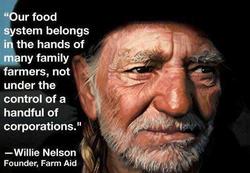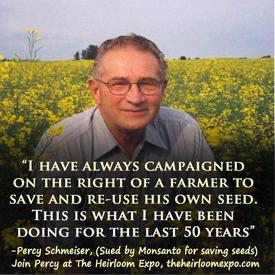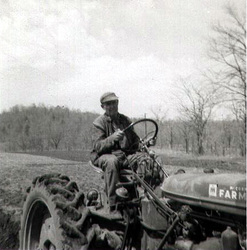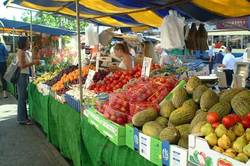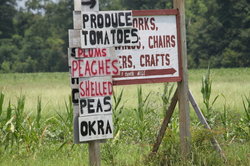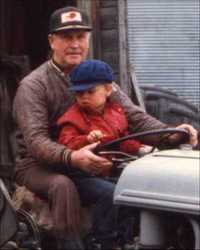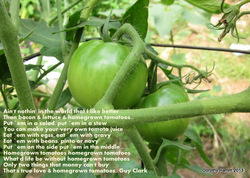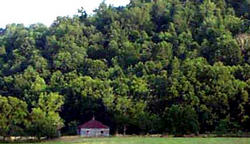Family Farmers
IF A FARMER FALLS IN MID-AMERICA DOES ANYONE HEAR?
This play on a well-known philosophical riddle was posed by Jim Hightower, Former Texas Commissioner of Agriculture, at the Irving, Texas Farm-Aid press conference in 1992.
Other speakers at the event included founders, Willie Nelson and Neil Young.
Kris Kristofferson, Jesse Jackson, Tracy Chapman and several farm coalitions.
Most of the text on this page is from a story I wrote for The Collegian, April, 1, 1992. About the only thing that has changed from that time is more family farmers have lost their farms, the price of fuel has increased, and grocery prices are higher.
"Farm Aid has worked to make sure consumers have a choice to put fresh, healthful
food, produced by family farmers, on their tables. One thing I've
learned is that real change will come from the 100 percent of Americans
who eat, not just the one percent who farm"...Willie Nelson
"The fight to save family farms isn't just about farmers," explained Farm Aid founder Willie Nelson. "It's about making sure that there is a safe and healthy food supply for all of us. It's about jobs, from Main Street to Wall Street. It's about a better America."
"One of the main purposes for the event is to raise awareness of the critical nature of the crisis farmers are facing today and to make Americans understand how important it is to keep family farmers on their land."
"About 2000 family farms are being lost each week," Nelson said. "And for each five farms that go under, at least one urban business will go under also.There is a direct tie-in between the farmers who lose their farms and the factory workers who lose their jobs," he said.
Some reasons cited for the decline of family farms are continual increases in the expenses for farmers coupled with a decrease in prices they receive for their products, government regulations and restrictions and the farmers inability to sell directly to the major grocery store chains
Ron Morrissette is a Vermont dairy farmer who milks 50 Holsteins. He also grows his own cattle feed and uses rotational grazing.
He supplements his income by doing occasional logging and by making maple syrup from his own trees, boiling it down himself and selling it directly to the public.
"That helps us survive," he said. "We can't sell directly to the grocery stores. Corporate American makes it hard for us."
Jim Hightower pointed out that although the farmer's expenses have spiraled upward, wheat prices are lower today than they were 10 years ago. "How many of you have had your grocery bill go down? Hightower asked. "While the price of wheat decreased 62 percent for the farmer, it increased 60 percent for the consumer." "The difference between a farmer today and pigeon," Hightower continued, "is that a pigeon can still make a deposit on a John Deere."
Loren Lopes, from Turlock, California is a dairy farmer who milks 250 Holsteins.
Lopes said his wife could not accompany him to Farm-Aid because a dairy farmer must milk twice a day, every day and he does not get enough money for milk to hire someone to work for him; therefore, his family does not have an opportunity to take trips together.
Lopes said he was fortunate that the long farming season in Southern California allows him to grow most of his cattle feed. When he has a goodcrop of corn or alfalfa, he is able to supplement his income from dairy farming by selling the excess.
"Reagan and Bush (Sr.) policies have deregulated agricultural prices," he said. "Although consumer prices have gone up, farmers' prices have gone down. We can't bargain with a perishable like milk--farmers are forced to take whatever is offered."
Click on photo below for an unsusual story about some hens rescued from an egg farm.
John Bridges, Big Barren, MO taken around 1960
Arlo Guthrie, whose father, Woody Guthrie, was an activist for farm workers rights in the depression days of the 1930s, said the following in a printed statement:
"Had the former Soviet Union kept their small family farms independent and free, they would not be hungry today. To depend on mega-national corporations and foreign countries for sustenance is suicide. Our small independent family farmers guarantee the quality and variety of our food."
For the past 20 years Neil Young has lived on a cattle ranch in Northern
California. He believes the family farmer's use of the land is better
for the ecology than methods used by conglomerate corporations that buy
failed farms.
"I have watched chemicals and overuse destroy great portions of the San
Joaquin Valley," he said. "Conglomerate farming practices ruin the
land. The bottom line is some accountant and a spreadsheet. They just
don't know when to let up and let the land rejuvenate."
"If we can find the money to build up the economy of Japan and Germany, we can find the money to build up the hands that have fed us and the workers who have made us strong," Jackson said.
"The plight of black farmers is even more critical than that of others," a representative of the Federation of Southern Cooperatives/Land Assistancefund (FSC/LAC) said. According to FSC/LAC figures, blacks owned 15 million acres of farmland in 1920, compared to 3.5 million today. In 1978 there57, 271 black farmers compared to 22, 954 today. "
Unfortunately, there is an on-going need for the kinds of help Farm Aid provides. We're still doing Farm Aid because it is still contributing. It's still doing a job...John Mellencamp
Since its beginning, Farm Aid has granted over million to more than 100 farm organizations, churches, and service agencies in 44 states.
Nelson said 84 percent of money raised for farm-Aid goes to organizations to help farmers and only about 16 percent goes for operating expenses.
Photo above by Doug Lang
Doug Lang, producer/host of Better Days, CFRO (www.coopradio.org) 102.7FM, Vancouver, BC) has been writing about the plight of Canadian farmers for more than 20 years. His song, Farmer's Lament, shows that the problems farmers face are universal.
Click on the photo below to hear the song.
photo above by Dave Mann
"My father loved farming like I love music," Bill Golden of the Oak Ridge Boys said. "I think the stress of worrying about prices, when it costs more to grow a product than you can sell it for, contributed to his death."
How can an average person help family farmers?
One way is to buy directly from farmers and from farmers markets and CSA farms.
According to the Farm-Aid website, the number of fatmer's markets across the country has increased in recent years. This is good news for seller and buyer. Buying produce directly from independent farmers just makes good sense. It is fresher and you can ask whether or not pesticides were used.
Family farmers were practicing "organic" farming long before they had a name for it.
--Dorothy Hamm
Below: From my small backyard garden.
